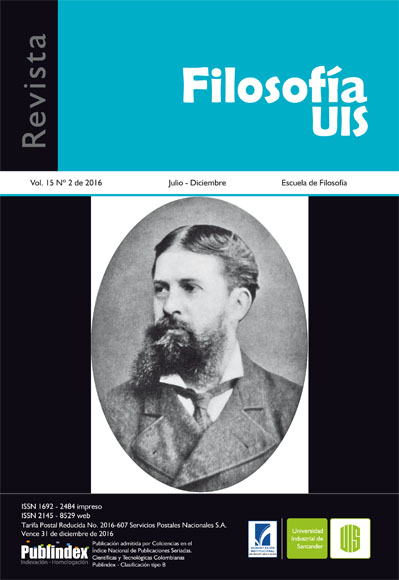Research Article
Phenomenological aspects in Thomas Hobbes’ theory of knowledge as the origin of the Civil state
Published 2016-11-30
Keywords
- theory of knowledge,
- phenomenology,
- civil state,
- language,
- natural state
How to Cite
Calle Zapata, M. (2016). Phenomenological aspects in Thomas Hobbes’ theory of knowledge as the origin of the Civil state. Revista Filosofía UIS, 15(2), 215–136. https://doi.org/10.18273/revfil.v15n2-2016011
Copyright (c) 2016 Revista Filosofía UIS

This work is licensed under a Creative Commons Attribution 4.0 International License.
Abstract
This text intends to account for the rationale and justification of the origin of the civil State from the phenomenological aspects of Thomas Hobbes’ theory. Undoubtedly, perception or intuition, sensitivity, imagination or memory, language, movement, calculation, desire, wish, fear, among others, are what lead the subject to understand his own nature; and from it, to come to agreements with other subjects giving in his natural rights to a third party, and therefore, to give an end to the natural state to be able to preserve his life and to live in peace.Downloads
Download data is not yet available.
References
- Bobbio, N. (1991). Thomas Hobbes. Barcelona: Paradigma.
- Bobbio, N. y Bovero, M. (1986). Sociedad y estado en la filosofía política moderna. México: Fondo de Cultura Económica.
- Copleston, F. (1973). “De Hobbes a Hume”. Historia de la Filosofía. Volumen 5. Barcelona: Ariel.
- Hobbes, T. (2000). Tratado sobre el cuerpo. Madrid: Trotta.
- Hobbes, T. (2004). El Leviatán. Tomo I. Buenos Aires: Losada.
- Hobbes, T. (2010). De Cive. Madrid: Alianza.
- Petrucciani, S. (2008). Modelos de la filosofía política. Buenos Aires: Amorrortur.
- Rawls, J. (2009). Lecciones sobre la historia de la filosofía política. Barcelona: Paidós.
- San Martín, J. (1994). La fenomenología como teoría fuerte de la racionalidad.Madrid: Universidad Nacional de Educación a Distancia.
- Wolff, J. (2012). Filosofía política una introducción. Argentina: Ariel.
- Zarka, C. (1997). Hobbes y el pensamiento político. Barcelona: Herder
